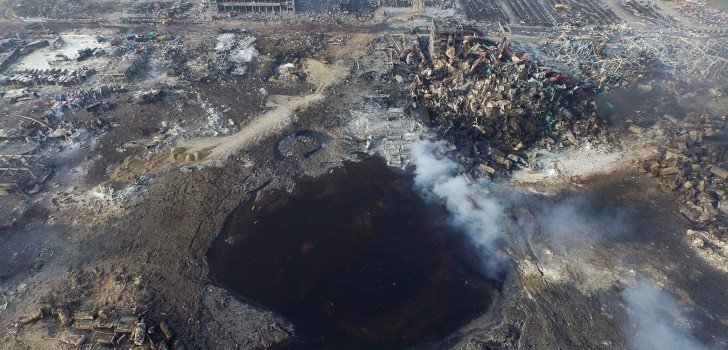The extent of the devastation caused by the massive explosions in Tianjin, China, this week may be greater than initially thought as authorities moved to evacuate the surrounding areas due to the threat from deadly sodium cyanide.
The death toll climbed to 104 people as of Saturday morning and president Xi Jinping called for greater reform in the area of industrial safety. The incident is a blow to China’s image on the global stage and a reminder that the nation is still developing.
The company responsible for the warehouse, Ruihai International Logistics Co., is suspected of violating hazardous chemical storage laws and executives are currently being questioned by the government. Tianjin is one of the country’s largest ports, importing some 40% of China’s automobiles. Due to the nature of the disaster, businesses in the immediate area carrying oil and hazardous materials have halted their operations while others remain unaffected.
Fires re-ignited Saturday leading to multiple explosions. A warehouse containing chemicals. including the sodium cyanide, was destroyed on Wednesday and police moved at 11am Saturday to enforce the evacuation after wind changes threatened to spread the toxic chemical inland. An exclusion radius of 1.9 miles will be enforced for people and vehicles.
During a press conference on the matter, the question was raised concerning the proximity of residential neighborhoods to such a hazardous industrial area, which led to CCTV coverage of the interview being cut short by state censors who have from the start been keen to downplay the incident.
Ruihai executives may have violated regulations that forbid placement of hazardous chemical storage within 0.6 miles of major transportation routes as well as residential areas. Satellite imagery of the warehouse shows railways, roads, and residential buildings within that limit.
The disaster illuminates the often shady practices of Chinese business when it comes to human safety. Past accidents have been blamed on poor enforcement of regulations, such as the 2013 oil pipeline explosion in Qingdao, which killed 62 and injuring 136.
Earlier this year a chemical plant fire led to the relocation of 29,000 in Zhanghzou. Although the government ordered inspections of chemical facilities nationwide, it remains to be seen whether the complacent attitude towards safety will be affected.
One Shanghai-based warehouse developer stated, “The operators of these warehouses typically get a tipoff before inspectors come, and they can hide the hazardous material. Companies need to take a stronger sense of responsibility regarding safety too.”
Stay Connected